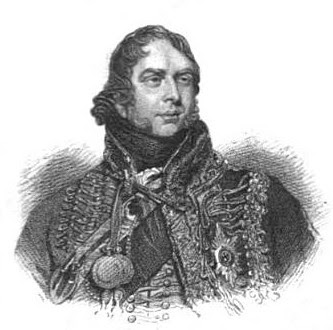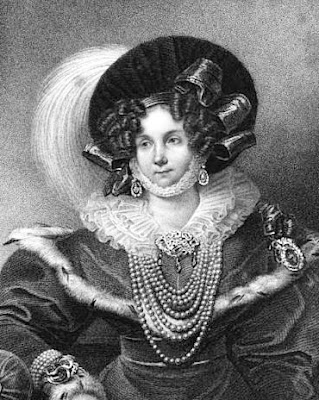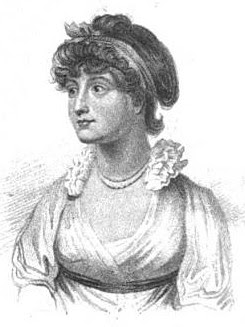 |
| HRH Ernest, Duke of Cumberland from A Biographical Memoir of Frederick, Duke of York and Albany by J Watkins (1827) |
Early years
Prince Ernest Augustus was born at Buckingham House on 5 June 1771. Ernest grew up at Kew, housed with his younger brothers, Augustus and Adolphus. The three Princes were made Knights of the Garter on 2 June 1786 and shortly after, were sent to the University of Göttingen to study.
Although commended for fighting bravely, he had a reputation for treating his men harshly and, despite regular promotion and being gazetted Field Marshal in 1813, he never saw active service abroad again.
Duke of Cumberland
On 23 April 1799, Ernest was made Duke of Cumberland and Teviotdale and Earl of Armagh and awarded a grant of £12000 a year by parliament.
Extreme politics
 |
| George IV from Memoirs of her late royal highness Charlotte Augusta by Robert Huish (1818) |
In character, he was radical and outspoken. He was able to wield a great deal of influence over weaker minds, notably over his brother George IV, whom he pushed towards his own radical Tory policies.
Ernest is not a bad fellow, but if anyone has a corn, he will be sure to tread on it.1
 |
| Frederica, Duchess of Cumberland from La Belle Assemblée (1830) |
The Queen disapproved of Princess Frederica who had been unofficially engaged to marry the Duke of Cambridge in 1797 but had become pregnant by the Prince of Solms-Braunfels and married him instead. Ernest’s marriage was very unpopular and parliament refused to increase his allowance, forcing the couple to live abroad, largely in Berlin, where their son George was born on 27 May 1819.
King of Hanover
When William IV died on 20 June 1837, his niece Victoria became Queen of England. But she could not accede to the throne in Hanover which could only pass to the male line, and so Ernest became King of Hanover. He entered his capital on 28 June and proceeded to attack the liberal constitution. He ruled autocratically, but listened to reasonable complaints and avoided any hint of revolution. Ernest was a good king and well-respected in Hanover and he successfully ruled during a very unsettled period in Europe.
A life of scandal
The Duke of Cumberland’s life was beset with scandal. On 31 May 1810, his valet was found dead and rumours circulated that he had murdered him, though the jury passed a verdict of suicide.
You can read more about the scandalous death of his valet here.
In 1813, he was involved in a political controversy over a parliamentary election in Weymouth. He was accused of influencing the outcome in favour of the Tories, which was considered improper behaviour for a member of the House of Lords.
Years later, he wrangled with Queen Victoria over some jewels that he declared were his by right under Queen Charlotte’s will and which his niece refused to give up. The bitter dialogue between the parties caused considerable embarrassment to the government and when Ernest visited England for three months in 1843, Queen Victoria showed her continued disapproval by only inviting him once to dinner.
Yet more scandal
In 1829, Ernest created a scandal over Lady Lyndhurst who claimed that he had tried to assault her and, when she resisted, had threatened to ruin her and her husband. The following year, he faced another over Lady Graves. Rumours of a relationship between Ernest and Lady Graves reached the ears of her estranged husband. Lord Graves wrote a note declaring that he did not believe them, but nevertheless committed suicide.
But the most serious scandal which confronted Ernest was in relation to his sister, Princess Sophia. His affection for her was judged by some to be unhealthily intense, and it gave rise to the rumour that he had fathered the illegitimate son she was said to have given birth to in 1800. Although this was almost definitely untrue, there are comments in her letters which hint at the possibility that he had tried to assault her.
 |
| Princess Sophia from A Biographical Memoir of Frederick, Duke of York and Albany by John Watkins (1827) |
If you have enjoyed this blog and want to encourage me and help me to keep making my research freely available, please buy me a virtual cup of coffee by clicking the button below.
Note
1. From The Letters of Queen Victoria (1908)
Sources used include:
Fulford, Roger, Royal Dukes (1933, revised 1973)
Hibbert, Christopher, George III (1998, Viking, Great Britain)
Hibbert, Christopher, George IV (1972, Longmans, 1973, Allen Lane, London)
Hibbert, Christopher, Queen Victoria (HarperCollins, 2000, London)
Huish, Robert, Memoirs of her late royal highness Charlotte Augusta (1818)
Palmer, Alan, Ernest Augustus (1771-1851), Oxford Dictionary of National Biography, (Oxford University Press, 2004, online edn, May 2009, accessed 23 Mar 2013)
Victoria, Queen, The Letters of Queen Victoria, A Selection from Her Majesty's Correspondence between the years 1837 and 1861, edited Benson, AC and Esher, Viscount, Vol I 1837-1843 (1908)
Watkins, John, A Biographical Memoir of Frederick, Duke of York and Albany (1827, London)



What a useful post.
ReplyDeleteDid anyone suggest that Victoria should marry Cumberland's son to retain the throne of Hanover for her male heirs?
Charlotte Frost
I have not come across this suggestion, Charlotte. I think there was a lot of bad feeling between the Duke and Victoria who was a constant reminder of how close he had been to the throne of England. Also, the Duke's son, George, was blind and therefore he may not even have considered trying to promote what he saw as a lost cause. On the other hand, the Duke of Cambridge did hope that his son George would attract Victoria's eye, but obviously she (and her uncle Leopold) had other ideas!
DeleteCharlot this is a late response to your interesting question as I wonder have you looked into what Greg Hallet has written about Victoria and the blind prince(George) getting together? And interesting from you Rachel too.
DeleteThanks for the suggestion - I'm not familiar with this writing.
DeleteI tend to get caught up in history's star players forgetting that there is always a supporting cast. Wonderful information that gives insight into what it's like to be a younger son often in the shadows.
ReplyDeleteI enjoyed your previous post, too. We've come such a long way understanding the needs of wild creatures. It's hard to imagine what the cages and confines for these animals must have been like.
Thanks for the encouraging comments. I think that the Prince Regent's brothers were an interesting bunch and I have enjoyed researching their lives.
DeleteThank you for another enlightening post. I think the English showed more sense in their attitude toward Ernest than did the Hanovarians.
ReplyDeleteObviously a firm believer in "The Importance of Being Ernest" He must have been he origianl, what a nasty piece of work.
There is not much to recommend Ernest, is there? In his defence, I think it must have been hard to have adjusted to the bad facial scarring he got in battle and maybe people were a little too ready to think he was bad because he looked sinister.
DeleteHe didn't look sinister, and probably a lot of what has been said about him has been exaggerated.
ReplyDeleteBut there's more than enough circumstantial evidence to show he DID father his sister's child. I know people don't want to believe that, but his behaviour towards her backs this up. His own brothers and other family thought so. Garth was just brought in as cover-up.
He was with his sister exactly 9 months before she had her baby, and he was there for her at the birth.
As for his reputation, again, you have to take a lot of claims with a grain of salt. Remember, Queen Victoria herself had this reputation of being this saintly Queen, but in actuality she was a petty, emotional, and jealous woman with a vindictive streak.
So, don't believe all you read. :)
Thanks for your comments. I agree that it is possible that Ernest fathered a child by Sophia, but the evidence is, as you say, circumstantial. He certainly seemed to be overly fond of his sister and it would explain why Garth remained in favour, but Garth could equally well have been the father of young Thomas Garth. I guess there are some things we will never know for certain :)
DeleteAs to Thomas Garth, fact supporting Ernest was NOT his father was his height. Ernest and all his brothers were tall. Captain Garth was not. And Thomas Garth was not tall. This is by no means proof but it provides the question. As for Ernest, he had man good qualities as well as bad but it seems that history has chosen to define him with the bad.
DeleteProbably no "smoking gun", so to speak, but a lot of strong circumstantial evidence.
ReplyDeleteThe son was known to look VERY royal. ;)
That is certainly in favour of him being Sophia's son, but not necessarily her brother's. I admit the possibility but remain open-minded. :)
DeleteHow did Yound Cumberland lose his sight?
ReplyDeleteI'm sorry but I don't know. I vaguely remember reading something that suggested a rather nasty childhood accident, but I have been unable to find the account. Most sources simply refer to it as an unspecified childhood accident or illness, or possibly both as some record that he lost his sight in one eye and then the other a few years later.
DeleteI do not understand why, when Willian IV died did the throne of England not go to Cumberland, being a brother of George IV and William, neither having a legitimate heir.
ReplyDeleteAs the only child of Edward, Duke of Kent (deceased), who was older than Ernest, Duke of Cumberland, Victoria took precedence in the line of succession. Ernest became King of Hanover as women were excluded from the succession there.
DeleteRachel, that is incredible - looks like in more ways than we could ever know, England was very lucky Victoria became its ruler, rather than Ernest.
ReplyDeleteI don't understand why the throne passed to Victoria, rather than one of her surviving uncles upon the death of William. Can you explain the succession?
ReplyDeleteBy law, on William's death the throne should have passed to his next brother in age - Edward, Duke of Kent. Clearly Edward could not become King as he had predeceased William, but the royal line still passed to his children in preference to Edward's next youngest brother. Edward only had one child, Victoria, and so she became Queen. In the same way, Prince Charles is heir to the throne today followed by his eldest son Prince William and not Charles's brother Prince Andrew.
DeleteI've seen the silver Royal (Buckingham Palace) Ice Bucket in M.S. Rau Antiques that supposedly was stolen (along with some other items) by Cumberland when he became King of Hanover. Supposedly, Victoria sued him for their return, without success.
ReplyDelete